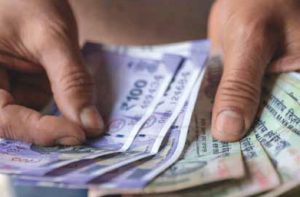 In a detailed scientific study conducted in 2013-14 and published in Journal “Future Microbial” (2014), wherein it was conclusively established that the paper currency and coins may be a public health risk when associated with the simultaneous handling of food and could lead to the spread of nosocomial infections. Banknotes
In a detailed scientific study conducted in 2013-14 and published in Journal “Future Microbial” (2014), wherein it was conclusively established that the paper currency and coins may be a public health risk when associated with the simultaneous handling of food and could lead to the spread of nosocomial infections. Banknotes
recovered from hospitals may be highly contaminated by Staphylococcus aureus. Salmonella species, Escherichia coli and S. aureus are commonly isolated from banknotes from food outlets. Laboratory simulations revealed that methicillin-resistant S. aureus can easily survive on coins, whereas E. coli, Salmonella species and viruses, including human influenza virus, Norovirus, Rhinovirus, hepatitis A virus and Rotavirus, can be transmitted through hand contact.
In this study conducted on bank notes and coins from ten countries around the world, Bank notes from India were found to have the greatest number of S. aureus isolates was found on paper currency that was recovered from hospitals. This could serve as a potential source of pathogens on paper currency that was recovered from hospitals.
Bacteria
Due to the differences between the textures of paper notes and the metal alloys used for coins, paper notes can accommodate a variety of contaminants, and these contaminants can persist for longer periods. In conclusion, laboratory experiments revealed that bacteria are able to survive on banknotes and coins, and that the potential for their transmission via money is possible.
Viruses
Human influenza viruses were able to survive and remain infectiousness for days when they were deposited on banknotes. Influenza contaminated hands can transfer the viruses to other surfaces or subjects and hands could become contaminated with influenza by coming into contact with surfaces inoculated with viral secretions.
Proposes a dynamic model for hand hygiene research and education strategies, together with corresponding indications for hand hygiene during patient care. Tested a very large number of banknotes obtained from food outlets in ten different countries.
Very recent study in which the effect of low and high relative humidity on bank note to finger transfer efficiency was tested. In this study, it was found that influenza virus can survive on banknotes.
Persistence of pathogens on surfaces
◆ Many bacteria and viruses can survive on surfaces.
Currency notes
◆ Cotton-based banknotes provide a fibrous surface, which provides ample opportunity for bacterial attachment, and the longer a paper bill stays in circulation, the more opportunity there is for it to become contaminated.
◆ Various bacteria, yeasts, fungi, cysts and ova of intestinal parasites have been isolated from money worldwide.
Coins
◆ The presence of an appreciable amount of copper in coined metal alloys seems to be the limiting factor for bacterial survival on coins in general.
◆ Various bacteria, yeasts and fungi have been isolated from coins worldwide. Fomites & money in the spread of nosocomial infections
◆ In hospitals, surfaces such as beds and keyboards, which have direct contact with hands, serve as reservoirs of nosocomial pathogens and vectors for cross-transmission.
◆ Banknotes can serve as a potential source of pathogens, and paper currency recovered from hospitals was highly contaminated by Staphylococcus aureus isolates. Fomites & money in the spread of food-borne outbreaks
◆ Salmonella species, Escherichia coli and S. aureus are commonly isolated from banknotes from food outlets.
◆ Prepared foods, such as salads, sandwiches and bakery items, are frequently associated with outbreaks of viral food-borne disease.
Experimental evidence of pathogen transfer by banknotes & coins
◆ In laboratory simulations, methicillin-resistant S. aureus can easily survive on coins.
◆ In experimental models, human influenza virus, Norovirus, Rhinovirus, hepatitis A virus and Rotavirus were able to be transmitted through hand-to-hand contact.
Prevention
◆ Hygiene training, including training in the techniques of hand washing and disinfection, is an essential measure for preventing nosocomial and food-borne outbreaks.
Future perspective
The capacity of banknotes, coins and fomites to serve as sources of pathogenic agents represents a major challenge in the 21st century. It is possible that the replacement of cotton-based banknotes by substrate material can play an important role in the reduction of bacterial concentration.
Many food handlers do not give much attention to hygienic practices, and money recovered from food handlers was highly contaminated. As a result, the presence of pathogens, such as E. coli and Salmonella species in currency can be potentially detrimental. E. coli and Salmonella spp. are indicators of poor hygiene, Hands are the most important fomites for the spread of nosocomial infection. Alcohol-based hand rubs can improve compliance with hand hygiene and reduce the transmission of pathogenic agents. In addition, routine surface disinfection is crucial to control the spread of nosocomial pathogens.
An essential measure for preventing food borne outbreak is hygiene training for food handlers. Many food outlets heavily rely on the exchange of money for food. The possibility that the handling of money might result in food contamination should bring about changes regarding how foods are handled and traded. Appropriate and regular hand hygiene, particularly after toilet visits and handling money, is critical. In addition, food-handling tools can help prevent cross-contamination occurring between money and food through contact with the hands if workers cannot or will not wash hands between tasks.
Commonly used objects by healthcare workers serving as reservoirs of nosocomial pathogens;Cell phone, Toilet paper, Pen, Stethoscope, Paper money, Coins, Uniform, computer keyboard, Books, Paper files, Patient equipment, such as beds and bedding
In this context, the FSSAI (Food Standards & Safety Authority of India), had issued an advisory in the year 2018 itself calling upon Commissioners of Food Safety of all States/UTs were directed to initiate a systematic campaign for generating awareness amongst all citizens to discourage simultaneous handling of food and currency notes / coins. Since it was observed that food handlers, food sellers and others handled currency and food simultaneously with bare hands, therefore, use of gloves etc., washing hads with soap and water after handling currency was advised. This was imperative to avoid cross contamination resulting in a wide variety of diseases.
Recently, the World Health Organization has also cautioned the public at large to exercise care when handling potentially infectious banknotes. A WHO spokesman quipped in reply to a question that it was very much possible since money changes hands frequently and can pick up all sorts of bacteria and viruses and things like that. Therefore, WHO advised people to wash their hands after handling banknotes, and avoid touching their face. … When possible it’s a good idea to use contactless payments.”
Despite reports that the World Health Organization was pushing people to use contactless payments, a spokesperson for the WHO clarified that it has not issued any warnings or statements about the use of cash. Recent studies show that “human corona viruses such as Severe Acute Respiratory Syndrome (SARS) coronavirus, Middle East Respiratory Syndrome (MERS) coronavirus or endemic human coronaviruses (HCoV) can persist on inanimate surfaces like metal, glass or plastic for up to 9 days.”
Though a few studies conducted earlier on the survival of corona viruses on paper or other potential banknote material, yet a study conducted on a strain of SARS found infectious coronavirus for up to 72 hours on “press paper” and 96 hours on “cloth.”
Based on structural similarities among corona viruses, it is a reasonable conclusion that this would hold true for the new Covid-19 as well. For this reason the WHO recommends — in general — washing one’s hands after handling money. However, the best defence against potentially infected money is simple: Not to touch one’s face or eat food after handling cash without washing one’s hands. It is imperative to wash one’s hands thoroughly after coming into contact with any money.
letters@tehelka.com












